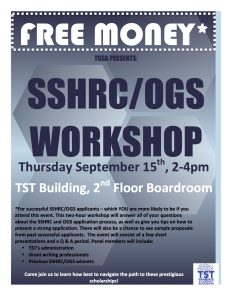A warm welcome to all TGSA members as they are beginning a new term this week. Your TGSA Board has already been busy holding meetings and planning some events to get you both informed and fed. We have two valuable events happening this Thursday, September 15th and we hope you will make yourself available to attend. It’s the free money/free food welcome back duo!
Free Money – attend TGSA’s first Professional Development event of the new year: our annual SSHRC/OGS Application Workshop. Learn how to make your application for these prestigious awards stand out among the rest by hearing from our panel of professional grant writers, TST administration, and past successful applicants. Thursday September 15th, 2 – 4 pm in the Second Floor Boardroom at TST (47 Queen’s Park Cres).
Free Food – Immediately after learning how to best apply for free money, we invite you to attend TGSA’s annual Welcome Back BBQ. This year it is being held at Knox College, 4:30 – 6:00 (59 St George St). All TST graduate students (and their partners and children too!) are welcome to join with us as we reconnect with our fellow students across all TST’s colleges and graduate programs. It’s a great chance to make connections with the wider TST graduate community, as well as to get info on what TGSA has planned for the remainder of the year.


